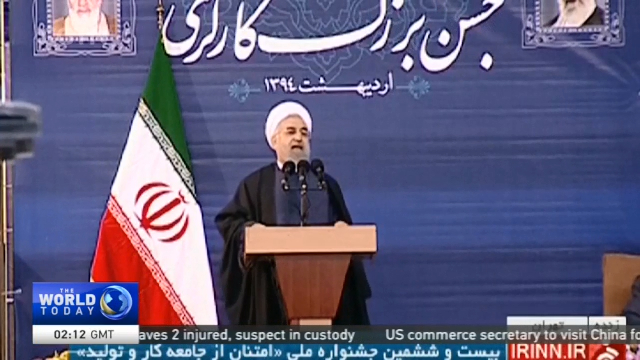
10:49, 26-May-2018
Saving Iran Deal: European, Chinese officials meet to salvage the agreement
03:04

Another issue has been discussed in Vienna, Europe where senior diplomats there are looking for a way to prevent the Iran nuclear deal from collapsing. This follows the withdrawal of the U.S. more than two weeks ago. Officials say negotiations will continue among representatives of the so-called E3+2 -- that is, Germany, France and the UK, plus Russia and China. CGTN's Mariam Zaidi reports.
Early Friday morning in Vienna. Representatives of the UK, France, Germany, Russia and China - the remaining signatories to the Iran nuclear deal - met with Tehran officials for talks on mitigating any fallout following the U.S. withdrawal from the nuclear deal.
Just a day earlier, the UN International Atomic Energy Agency reported that Iran is adhering to the accord.
MIKHAIL ULYANOV, HEAD OF DELEGATION RUSSIAN AMBASSADOR "The director general of the IAEA came into the meeting and confirmed that once again that Tehran fully complies with its obligations under the deal."
Officials at the special meeting of the parties to the Joint Comprehensive Plan of Action, or JCPOA, said progress in Vienna had been substantial.
SEYED ABBAS ARAGHCHI IRANIAN DEPUTY FOREIGN MINISTER "We got the sense that Europeans, and Russia and China - as remaining participants to the JCPOA are serious. They recognize that the JCPOA's survival depends on interests of Iran to be respected."
But the clock is ticking. Iran's President Hassan Rouhani wants guarantees from Iran's partners. Iran wants a package of incentives on the table by the end of May. It also wants legal and political guarantees that ensure the deal's survival without the United States involvement. But officials at Friday's meeting said they can give NO guarantees at this point.
WANG QUN, DIRECTOR GENERAL ARMS CONTROL, CHINESE FOREIGN MINISTRY "Our Iranian colleagues are sincere. And we were given the impression that they for their part are to continue to safeguard the agreement. Although they indicate that would perhaps take them about two to three weeks to finally decide if they will stay in the nuclear deal."
There is much at stake. Not just for Iran. Italy, for example, signed a six billion dollar investment with Iran at the beginning of this year. China and the EU are looking to ramp up crude oil exports from Iran.
MARIAM ZAIDI VIENNA "The EU Commission last week said it was updating its 'blocking statute'. It's an old law from 1996 that would prohibit European companies from complying with U.S. sanctions on Iran. Once in place, that could help the EU in particular give Iran the guarantees it's looking for. But a formal process like this takes time. Officials on Friday said it's unlikely to be in place by the end of May. Mariam Zaidi, CGTN, Vienna."

SITEMAP
Copyright © 2018 CGTN. Beijing ICP prepared NO.16065310-3
Copyright © 2018 CGTN. Beijing ICP prepared NO.16065310-3